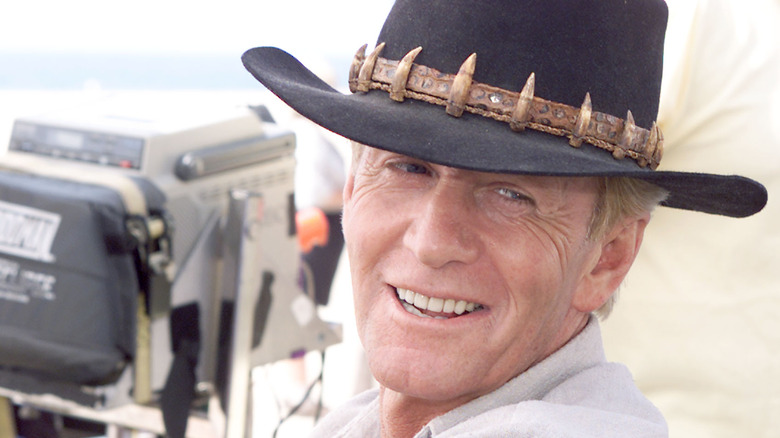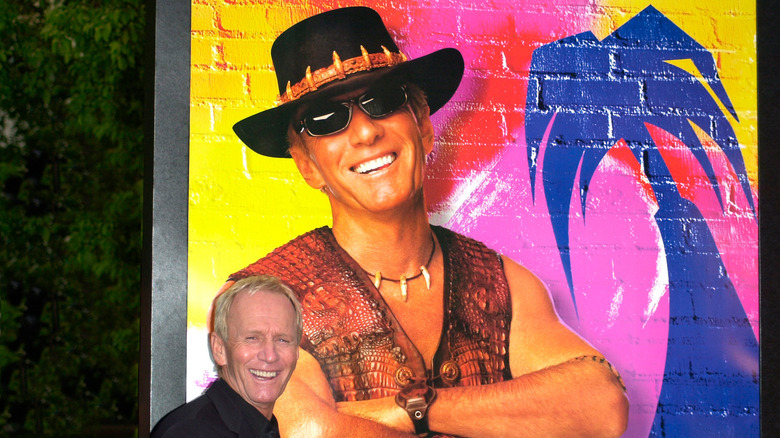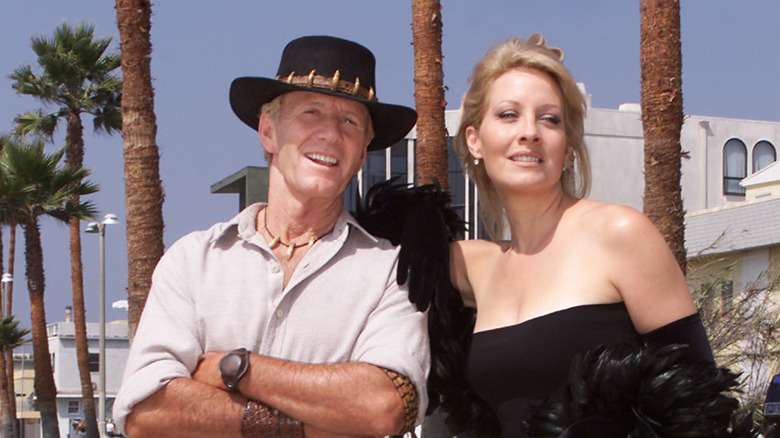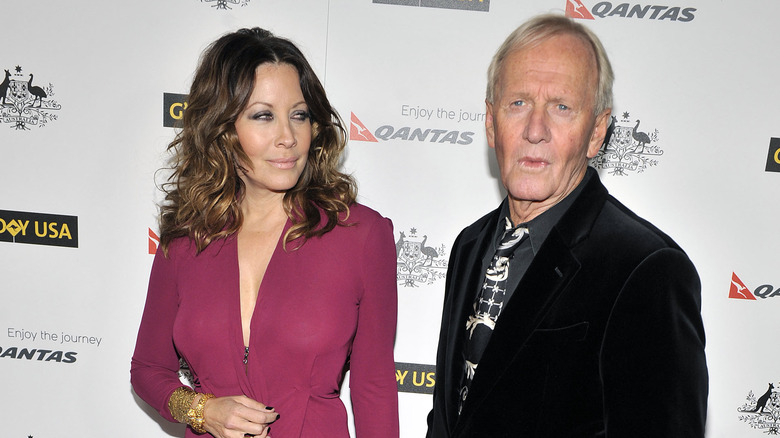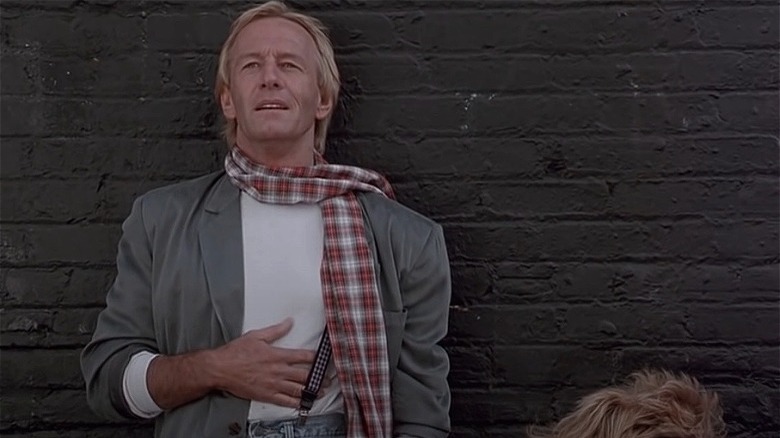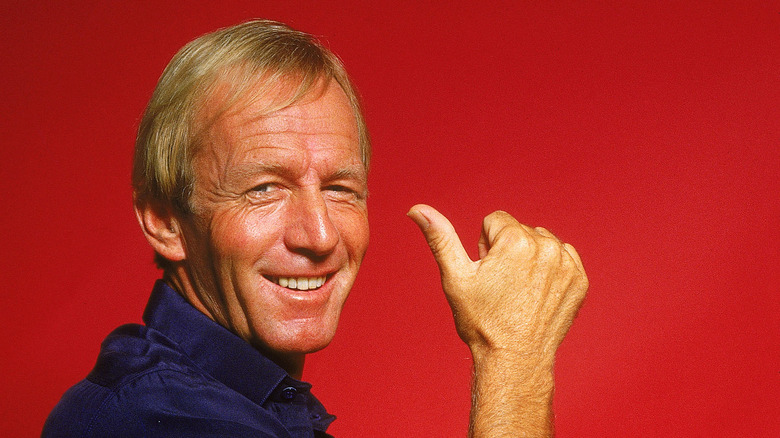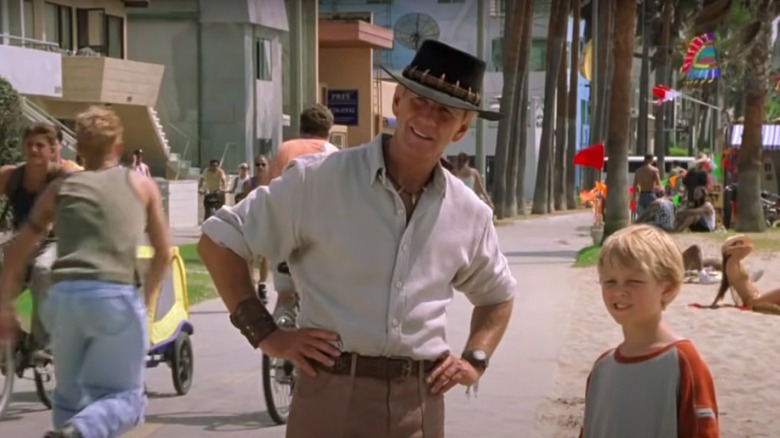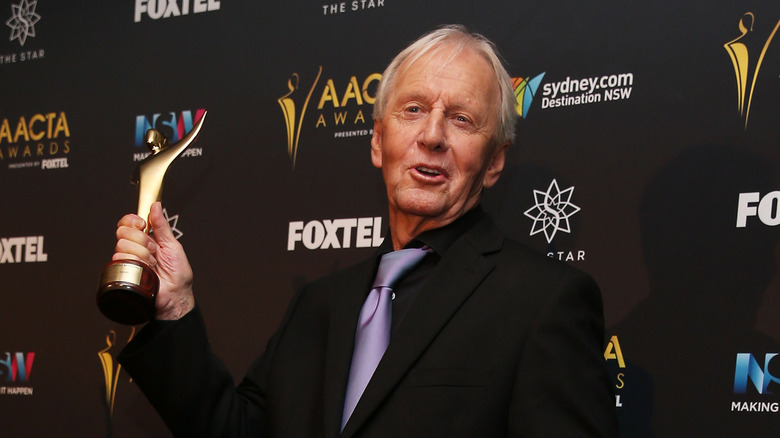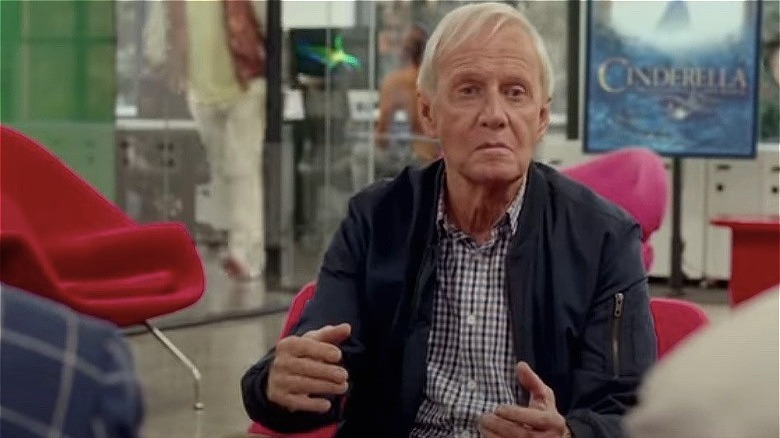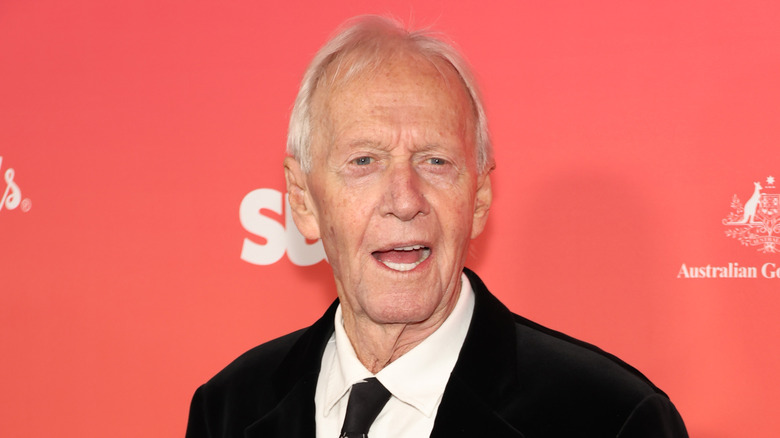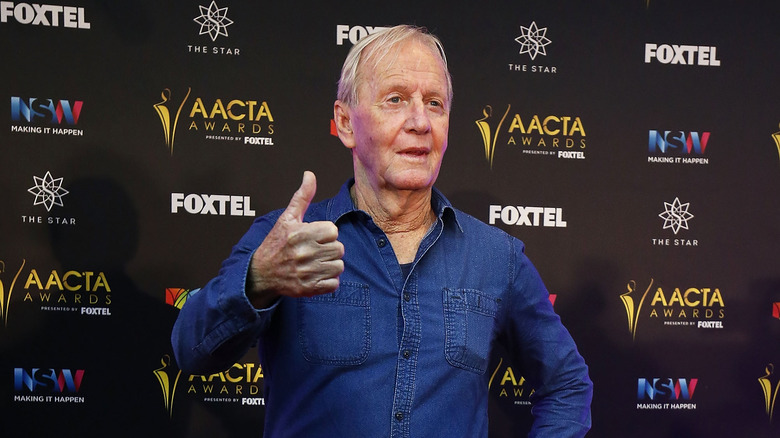Whatever Happened To Paul Hogan From Crocodile Dundee?
In 1971, 32-year-old Paul Hogan was working as a rigger on the Sydney Harbour Bridge when he and his co-workers discussed the rude treatment of contestants by the judges on the Australian TV talent competition "New Faces." Hogan hatched a plan, cooking up a ridiculous act as a knife-throwing tap dancer, for the sole purpose of giving them a taste of their own medicine by berating and mocking them after his ridiculous performance. Viewers loved him, leading to further television appearances and then his own sketch comedy series, "The Paul Hogan Show," which ran for more than a decade.
In the mid-1980s, Hoges, as he'd been nicknamed by fans, decided to try his luck on the big screen. After struggling to line up investors, he wrote and starred in his first movie, a fish-out-of-water comedy about an Australian crocodile hunter who winds up in the Big Apple. Made on a shoestring budget, "Crocodile Dundee" went on to become a massive blockbuster that raked in nearly $330 million worldwide at the box office and remains Australia's highest-grossing movie.
"Crocodile Dundee" brought the unlikely star to new levels of fame and fortune, propelling him to international stardom far beyond the shores of his native Australia. There's no denying that Hogan, who turned 83 in 2022, has had an extraordinary career, particularly when considering how accidentally it all started. Read on to find out what happened to Paul Hogan from "Crocodile Dundee."
Crocodile Dundee made Paul Hogan fabulously wealthy
Paul Hogan had hoped that "Crocodile Dundee" would find an audience, but he never envisioned that the $7-million movie would achieve a worldwide box-office take of $328 million — earning nearly 47 times what it cost to produce. In fact, the 1986 film was such a massive hit that at one point Hollywood execs considered a "Crocodile Dundee"/"Beverly Hills Cop" crossover movie that would partner Hogan with Eddie Murphy. "That was floated around for a while, back in the early '90s," Hogan told Yahoo! Entertainment. "That never ever came to anything. But that might've been a funny mixture."
The film's remarkable success took Hogan by surprise. "I've always said it was like going to the Olympics and rolling up your jeans and saying, 'Can I have a run in the 100?' And then winning the gold medal," Hogan said, describing the experience of leaping instantly from Australian TV comedian to international movie star, during a different interview with Yahoo! Entertainment. "It was that unlikely."
That "unlikely" hit made an even less likely contribution to Hogan's bank account; Australia's 9Honey estimated that Hogan personally earned a staggering $100 million from his first movie. Hogan's Hollywood career certainly didn't end after "Crocodile Dundee," but that film remains the most successful thing he's ever done. "I didn't see it coming," Hogan told Forbes more than 30 years after the film's release.
He married his Crocodile Dundee co-star Linda Kozlowski
Paul Hogan was heavily involved in the casting of his "Crocodile Dundee" co-star, Linda Kozlowski. "Before 'Dundee' she was unemployed and broke," Hogan told People, "but she delivered the goods. She was a star-in-waiting."
Not only were the pair a couple on-screen, but they also began a romance in real life — not ideal, considering Hogan was 20 years her senior and married with five kids. Their affair whipped up a media frenzy; a gossipy piece in the Sydney Morning Herald, for example, reported that their canoodling on a flight was "steamier" than anything seen on-screen — and also referenced the $16.5 million Hogan would be paying his ex-wife in their divorce settlement.
In 1990, Hogan and Kozlowski tied the knot in his hometown of Sydney. As the Los Angeles Times reported, the nuptials took place at the Byron Bay mansion he built for his new bride as a wedding present — for a record-breaking cost of $8.1 million Australian. "I'm not one for mushy sentiments," Hogan told the Christian Science Monitor, "but I knew she was the one." In 1998, the couple welcomed their first (and only) child together, son Chance. "I was about to turn 40 and just wanted to have a baby, and time was running out and I was miserable, really, in the last two jobs I'd done," Kozlowski told Scripps Howard News Service of her conscious decision to step back from acting in order to prioritize motherhood over stardom.
His divorce from Linda Kozlowski was amicable — but expensive
Paul Hogan and his "Crocodile Dundee" co-star Linda Kozlowski were married for 23 years — until Kozlowski filed for divorce in 2013. Less than a year later, the divorce was finalized. In the split, Kozlowski received $5.775 million, in addition to cash sitting in a few bank accounts, various art, furniture, jewelry, and her 2013 Mini Cooper. She was also permitted to stay in the Los Angeles home they had shared until the start of 2018, at which point she was given the option to purchase it from her ex-husband for $1.59 million
"Honestly, we just naturally grew apart," Kozlowski told the Sydney Morning Herald after the divorce. "One of our problems was we really had nothing in common and, over time, that happens to a lot of people."
Hogan shared his own take on what had gone wrong with the marriage, telling the Daily Telegraph that it had simply run its course. He also had no problem shouldering the blame, at least jokingly. "I'm not much of a partner," he quipped. "I'm good early on, but after 20 or 30 years or so they get sick of me." However, Hogan refused to get too reflective of what had gone wrong. "But you don't go around explaining what worked and what didn't," he added, "you just get over it."
He made a few more movies but never came close to his Crocodile Dundee success
In Hollywood, success begets sequels. Two years later, Hogan returned with "Crocodile Dundee II." It made money — nearly $110 million at the box office — but proved to be a case of diminishing returns, both creatively and financially, when compared to the original. In 1990, he starred in his first non-"Crocodie Dundee" movie, reuniting with Linda Kozlowski for "Almost An Angel." Its tepid reception — it earned less than $7 million worldwide — spoke for itself.
Hogan continued to star in more films throughout the rest of the 1990s, including the western "Lightning Jack" (which brought in just $16.8 million), and "Flipper," ($20.8 million).
Speaking with Yahoo! Entertainment about the box-office triumph of "Crocodile Dundee," Hogan admitted that he eventually came to realize that he was never going to capture lightning in a bottle again. "I was a comedy writer who was lucky enough to do my stuff onscreen," he explained. "And because of the ridiculous success of 'Dundee,' which is still the most successful independent film ever made, it's sort of like, 'Oh, whatever I do next will be a flop by comparison. So why bother?'" Hogan was also well aware of his own limitations as a thespian. "Not a very good actor," he self-assessed in an interview for "Australian Story." "I'm sort of like a one-trick pony. I can do minor variations, but you're never gonna see me in 'King Lear' or something."
He was investigated in Australia for tax evasion
Suddenly swimming in "Crocodile Dundee" money, Hogan entrusted his millions to financial adviser Philip Egglishaw, who allegedly convinced him to shift his money into offshore accounts and Swiss banks. Hogan, admittedly no economist, liked what he heard and gave Egglishaw free rein. That proved to be a mistake when Egglishaw fled, and Hogan filed a lawsuit, claiming Egglishaw parked $34 million Australian of Hogan's cash in a Swiss bank account that the actor was unable to access. Hogan sued, claiming that Egglishaw ”absconded with or spent all” of his millions.
When Australian tax authorities caught wind of the situation, a bad situation turned worse, as Hogan was hit with a massive tax bill, reportedly more than $15 million Australian, plus hefty penalties. He avoided the repercussions temporarily, reported CBC News, because he was living in L.A. — until he flew back for his mother's funeral, and was prevented from leaving until he settled up. Hogan continually professed innocence. "If I was a tax evader, which I'm not, I must be the dumbest one in the world, because they gave me five years' notice that they have seized every piece of paper that my tax advisers and lawyers and accountants have ever had," Hogan declared (via CBC News).
In 2012, after a seven-year battle, Hogan finally reached a settlement with Australian authorities; no charges were ever filed.
His third Crocodile Dundee movie was an embarrassing bomb
After a string of box-office flops, Hogan decided to take one more kick at the can with the 2001 sequel "Crocodile Dundee in Los Angeles." Interviewed by Combustible Celluloid, Hogan inadvertently admitted the script was lacking. "It's not a tight, plot-driven ship. It's a comedy. It's a knockaround Mick Dundee for an hour-and-half, basically ... looking at the world the way he does," Hogan said of the film's skimpy plot
While the notion of a third "Crocodile Dundee" movie pretty much screamed "money grab," Hogan insisted that had nothing to do with his decision to resurrect the character. "This is not a pathetic attempt to revive my sagging career," Hogan told IGN. "What career? A man's got a body of film of about four movies in about 10 years or something. I do it because I think I can do a good job of something and I'll enjoy it, do it, and sort of vanish. I don't want to be an actor for hire."
When the film was released, reviews were awful. So was the box office, as it earned less than $40 million worldwide — a 10th as much as the first one. "Crocodile Dundee in Los Angeles" did, however, earn some dubious recognition when it received a Razzie nomination for worst remake or sequel. "I got talked into doing it," Hogan told Forbes, noting that the film's failure "sent me the signal that the franchise is over."
He received Australia's most prestigious film honor
In 2016, Paul Hogan was recognized in his homeland for his contribution to Australian film. As announced by the Australian Academy of Cinema and Television Arts, Hogan was that year's recipient of the AACTA Longford Lyell Award, described by the organization as "the highest honor that the Australian Academy can bestow upon an individual and recognizes a person who has made a truly outstanding contribution to the enrichment of Australia's screen environment and culture."
In his acceptance speech, Hogan joked about the numerous glowing tributes that preceded his being presented with the award. "This is probably the worst roast I've ever been to," he quipped. "How'm I supposed to insult anybody when they've all [said] nice things about me?" He also took a self-deprecating shot at himself, referencing the time he famously opened the 1987 Oscars — and totally killed — back "when I was a star."
After the ceremony, reported The Guardian, Hogan admitted he found it "mystifying" that he'd been introduced by Oscar-winning AACTA president Geoffrey Rush, questioning how he could be connected to such a legitimate thespian. "[Rush] is an actor. I only play one character," Hogan told reporters, while modestly sharing the origins of his most famous cinematic creation. "Crocodile Dundee started out as a sketch — it was supposed to be Hoges in New York, a fluke," he added.
Paul Hogan attempted a late-in-life comeback
After the catastrophe that was "Crocodile Dundee in Los Angeles," Hogan continued acting, albeit sporadically, and primarily in his native Australia. In 2004, he co-starred in the Australian comedy "Strange Bedfellows," and five years later in another Australian movie, "Charlie & Boots." His next screen credit wasn't until 2015, when he appeared in an episode of Aussie TV sketch-comedy series "Open Slather," and was part of the ensemble cast of 2018 film "That's Not My Dog!"
As Hogan told Forbes, he suddenly became a hot commodity again when a 2018 "movie trailer" for "Dundee" aired during the Super Bowl, and went viral. Purportedly a reboot starring Danny McBride as Mick Dundee's son, the whole thing was eventually revealed to be a cleverly disguised Australian tourism commercial, with Hogan himself even making a brief appearance. That led to a full-fledged comeback with 2020's "The Very Excellent Mr. Dundee," in which Hogan plays himself as an elderly, one-hit-wonder ex-movie star who can't shake his biggest hit from 30-plus years ago. To sweeten the pot, he filled the film with celebrity cameos from the likes of Chevy Chase, Olivia Newton-John, and John Cleese.
Asked by Forbes if he would ever play Mick Dundee one final time, Hogan responded, "Oh, no. No, it's over. It happened. It was a huge success, and I'm thrilled and proud of it ... What am I going to do now? Get around the place with a walker in a retirement village? It's done."
He experienced health problems in his 80s that left him frail and 'feeble'
In late 2022, Paul Hogan — 83 years old at the time — appeared on Australia's "A Current Affair," where he candidly spoke about some health issues that he had been experiencing. "I've been better. I had a problem on the aorta and the kidney and the treatment fixed it but it shrunk me," he explained, revealing the treatment came with some less-than-desirable side effects. "I just ... I've lost all my body fat and the muscles all shrank and my strength has come back because it left me feeble ... I've just got zero body fat."
In another part of the interview, reported 7 News, Hogan lamented the rapid physical deterioration he'd experienced, which he blamed partly on that medical treatment, and partly on the ravages of time. "I maintained ... right up 'til 79 I was still fit," he said, admitting that despite his best efforts he'd been unable to stave off the impact of old age. "I'd still take out most 40-year-olds, then I turned 80, and there's a saying that turning 80's not for sissies because things start to fall apart but, no, I can't complain."
Paul Hogan wrote some books
Television and film aren't the only mediums that Hogan has conquered. Alongside his cinematic output, there are also his literary offerings: two books, both written in the later years of his life. The first arrived in 2020, a memoir with a wry title referencing his unorthodox entry into show business, "The Tap Dancing Knife Thrower" — subtitled "My Life (without the boring bits)."
In 2022, Hogan published his second book, "Australia According to Hoges." This one, while not necessarily an autobiography, was in a similar vein, with the cover blurb promising readers "yarns and stories about my favorite bits of Down Under" (in an excerpt, Hogan wrote about what it was like growing up in a Sydney suburb during the 1950s).
After living in Los Angeles for decades, writing those books about his past in Australia must have made Hogan nostalgic for his native land. "I've been homesick for years," he told the Daily Telegraph. "I miss the people, the ambiance — and there's something you just can't put your finger on, but there's something about Australia that is friendlier and more laid-back." There was one key factor, he explained, that prevented him from returning: "I'd rather be there, but I have my last child [Chance], who is an American — he only has me, whereas my tribe at home, they've all got each other."
